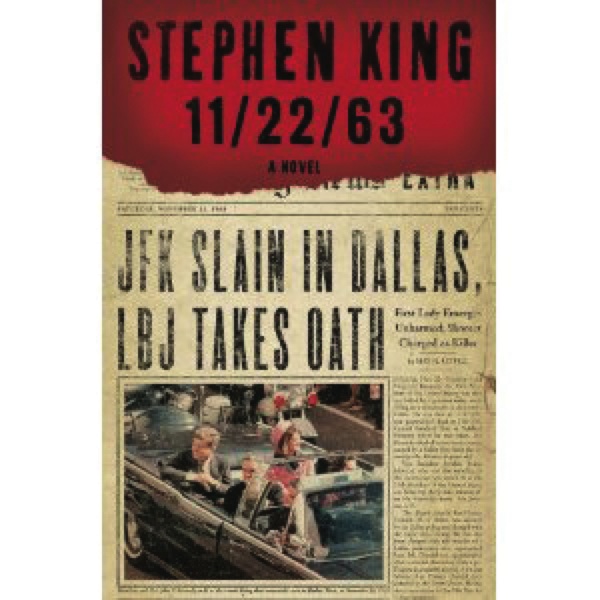Most people at one time or another are given to wonder what could have been “if only.” For many, it is sparked by a lost love, a bungled opportunity or a dark turning of events. Occasionally it’s less personal, more global. In all cases, it’s a fool’s errand: We can never know what might have been.
Unless you’re Stephen King. In his new novel, “11/22/63,” coming out this Tuesday, he contends with all of the above. For anyone alive in 1963, the title is self-evident: It was the day President Kennedy was assassinated by Lee Harvey Oswald in Dallas. Or maybe not in King’s world.
Jake Epping, the protagonist, is a high school English teacher in Lisbon Falls, Maine. He is divorced and emotionally estranged from himself. But he’s friends with Al Templeton, who runs Al’s Diner. A desperate call from Al sets things in motion. Al’s dying of cancer, and needs a favor. He reveals that the pantry in his diner is a time portal back to 1958. And he needs Jake to go back to stop Oswald from killing JFK.
Epping is flummoxed by the idea of time travel and the very idea of changing history. But he ultimately agrees to become a “temporal Bedouin” for altruistic reasons. One of his night students, Harry Dunning, is the crippled high school custodian. In his GED class, Jake has students pen an essay about “The Day that Changed My Life.”
Dunning’s story is harrowing. It tells of the murder of his mother, sister and two brothers, and of his own maiming by his alcoholic father on Halloween 1958.
Epping initially enters the pantry in Al’s Diner to alter those events. He succeeds. But he quickly discovers that even the altered past can still carry a bite.
He also discovers that there are rules governing time travel. First: No matter how long you stay in the past, the elapsed time in the present is only two minutes. Second: Every time you return to the past, it resets all that was altered by previous trips. Third: In the words of Epping, “The past does not want to be changed — the past is obdurate.” It’s “obdurate for the same reason a turtle’s shell is obdurate: because the living flesh inside is tender and defenseless.” The bigger the past event, the bigger the barriers erected to thwart changing it.
And finally: “The past harmonizes,” or repeats itself, brewing haunting coincidences the more times you go back and the longer you stay.
This is classic King, one of the great imaginative storytellers of our time. His talent is less about being the prince of fright and more truly about being the king of surprise and story craft. And he doesn’t fail his readers here.
One of the great treats in “11/22/63” is that it’s a wonderfully evocative love story. King makes you ache for the fate of Jake and Sadie Dunhill, the young new librarian who comes to Jodie, Texas, to escape a tragic, ill-fated marriage in Georgia. Jake has selected Jodie as his base camp for shadowing Oswald. He becomes a teacher at the high school while waiting for 1963 to roll around.
Sadie is tall, warm-hearted and perpetually clumsy, but a quiet beauty to the bone. Jake’s growing love for her greatly complicates his mission to stop Oswald. And his secrecy about being from the future and why he’s here creates mistrust in Sadie as her love for him deepens.
The book is riveting and entertaining. But it also strips away the comforting delusion hidden in the question what might have been, unmasking the magical thinking that it would be better than what is. Jake Epping is forced to contend with the “butterfly effect” of chaos theory — that if you change one thing, all assumptions about what will result will fail you. Although you might get a second chance at Al’s Diner, the moral is that you will still never get a free lunch.
What you get here is a great read. It brims with fabulous characters, from Deke Simmons, a decent man who is principal of the high school in Jodie; to Mimi Corcoran, the school’s straight-talking librarian whose retirement makes way for Sadie. There is also Mike Coslaw, the hulking lineman-cum-star-thespian in the school play, and Bobbi Jill, his sweet cheerleader girlfriend. And a long string of others.
A line late in the story is both a fitting and telling summation of the book. Jake is lamenting the way of the world, past and present:
“A universe of horror and loss surrounding a single lighted stage where mortals dance in defiance of the dark.”
Frank O Smith is a Maine writer, ghostwriter and writing coach.
Copy the Story Link
Send questions/comments to the editors.



Success. Please wait for the page to reload. If the page does not reload within 5 seconds, please refresh the page.
Enter your email and password to access comments.
Hi, to comment on stories you must . This profile is in addition to your subscription and website login.
Already have a commenting profile? .
Invalid username/password.
Please check your email to confirm and complete your registration.
Only subscribers are eligible to post comments. Please subscribe or login first for digital access. Here’s why.
Use the form below to reset your password. When you've submitted your account email, we will send an email with a reset code.